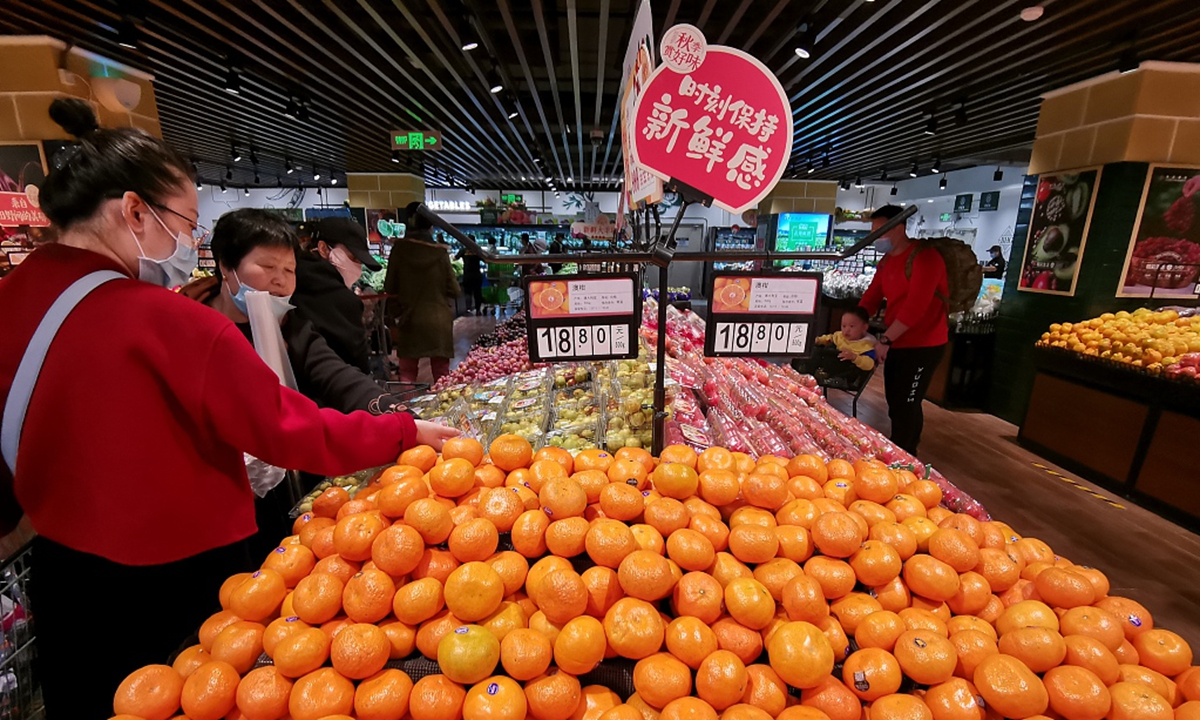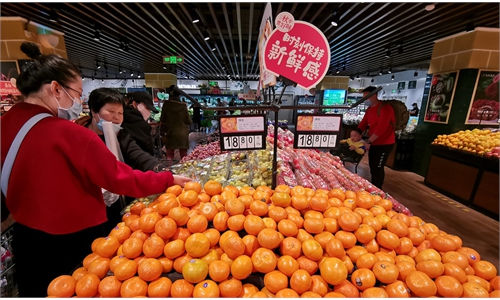China’s April consumer prices hit five-month high while factory inflation eased following COVID-19 impact

CPI Photo: VCG
China's consumer price in April rose to its highest annual pace in five months following domestic COVID-19 flareups and rising international commodity prices.
Analysts expect a moderate price pick-up over the coming months disrupted by short-term sporadic outbreaks and the surging price of global commodities but said the inflation remained controllable on the whole as China's measures to ensure supply and stabilize prices continue to exert force, helping to mitigate supply shocks.
China’s April consumer price index (CPI), rose 2.1 percent on year, expanding from the 1.5 percent growth in March, the National Bureau of Statistics (NBS) said in a statement on Wednesday, beating market expectation of 1.8 percent.
The increase of CPI was mainly caused by rising food and oil prices, NBS data showed.
Month-on-month, the food prices swung to a gain from a decline in April due to the rising logistics costs during the epidemic and increased demand for stockpiling, Dong Lijuan, a statistician at the NBS said.
Food prices rose 0.9 percent in April from March compared with a1.2 percent decline in March, contributing about 0.17 percentage points to the CPI increase, the National Bureau of Statistics confirmed.
The price of eggs and fresh fruits rose by 7.1 and 5.2 percent from March respectively. Pork prices rose 1.5 percent from a 9.3 percent drop last month due to the restored production capacity of hogs and the release of the central reserve.
In the context of the Russia-Ukraine conflict, international oil prices which continued running at high level also pushed up the prices of non-food items with gasoline and diesel prices rising 2.8 percent and 3.0 percent respectively from the previous month.
Analysts said China’s consumer prices will continue to pickup moderately but the overall inflation is controllable.
The latest round of epidemic, energy price fluctuations, rise of pork prices and the low base effect from last year is expected to drive the inflation in the short term, Zhou Maohua, a macroeconomic analyst at Everbright Bank, told the Global Times on Wednesday.
As the epidemic is gradually brought under control and the government continues rolling out measures to ensure the supply, stabilize prices and unclog logistics supply chains for agricultural and industrial products will return to the normalized level, Zhou said.
The growth of producer prices continue to moderate in April for the straight sixth month in backdrop of the epidemic flareups, weaker domestic demand and government measures to stabilize price hikes.
Analysts expect producer price growth to remain at a low level through the year.
Producer price index (PPI) increased 8.0 percent in April from a year earlier, slower than 8.3 percent growth in March, higher than the expected growth of 7.8 percent.
On a month-on-month basis, producer prices rose 0.6 percent in April, down 0.5 percentage points from the previous month.
The PPI growth is expected to continue to ease in the year dragged down by weak energy commodity demand of major economies and increased domestic efforts to stable energy commodity supply and prices, Zhou said.
However in the short term, the impact of international geopolitical conflicts and the global epidemic still weigh on the energy commodity market.
“Domestic enterprises may still bear the pressure of high costs of energy and raw materials in the near future and the risk of imported inflation need to be prevented closely,” Zhou said.
Chinese officials are paying close attention to the inflation and economic difficulties faced by China's industrial economy, including logistics woes and high bulk commodity prices.
China’s central bank, the People’s Bank of China said in its monetary policy report for the first quarter of 2022 on Monday that it will pay close attention to price trends, support grain and energy production to ensure supply, and maintain overall price stability.
The trend of prices in recent months shows that China's moderate inflation has had only a limited impact on domestic policies for stable growth but domestic policy needs to be tailored to increase support for weak links in the real economy, including support the tackling the normal operation of basic freight and logistic and stabilizing the expectation of business and consumers, Zhou said.

